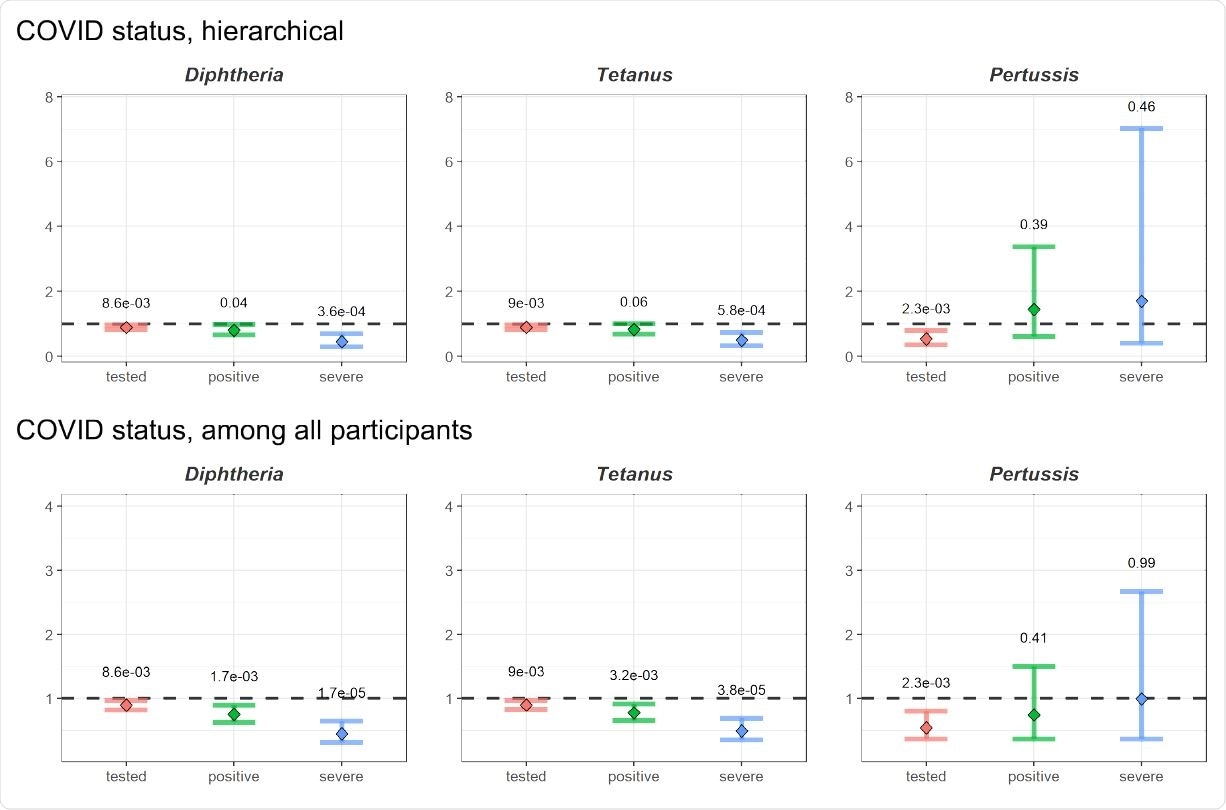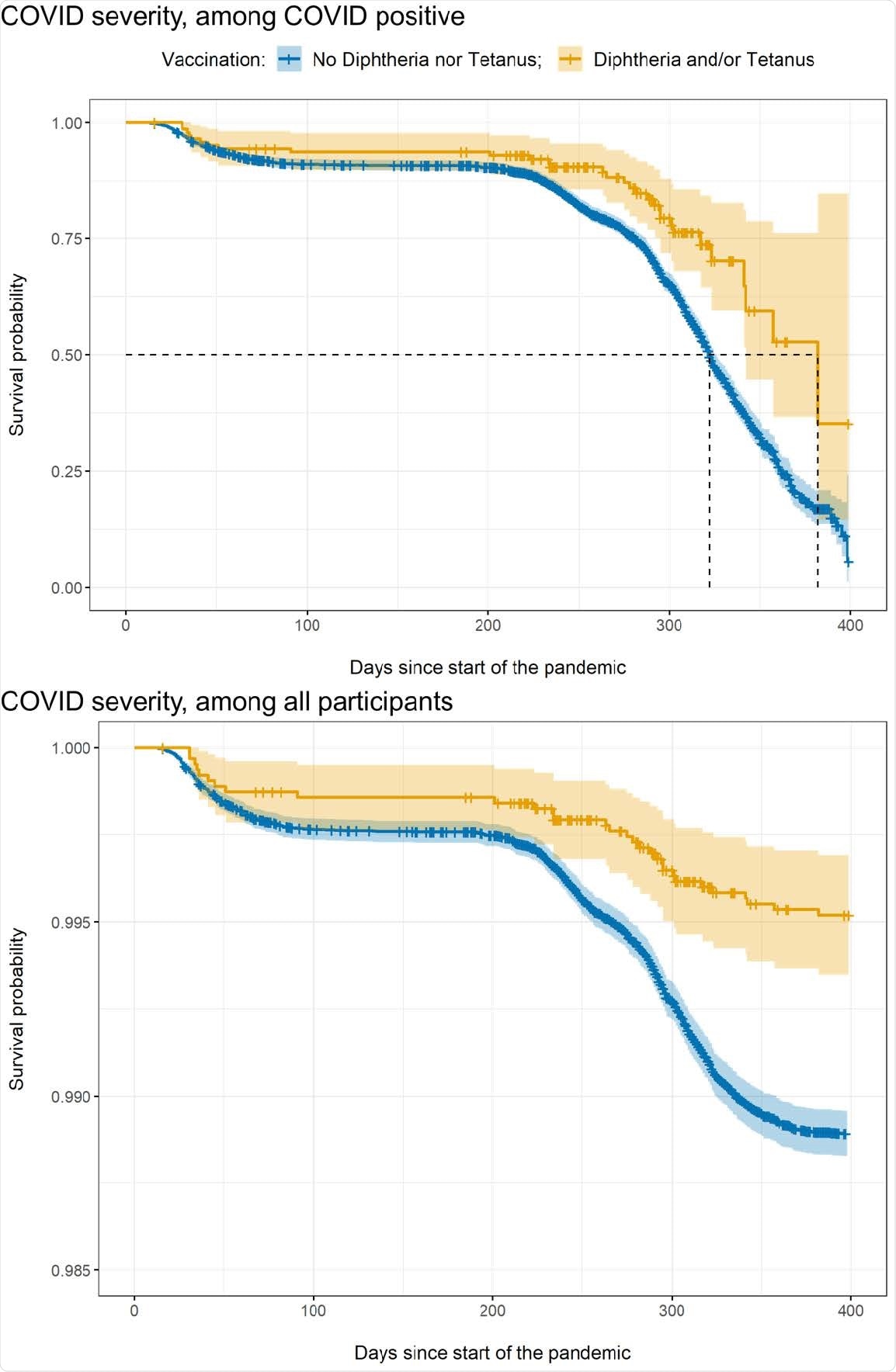Around the world, COVID-19 (coronavirus disease 2019) vaccines are being administered. However, the virus responsible for the pandemic, severe acute respiratory syndrome coronavirus 2 (SARS-CoV-2), is likely to stay and linger for the foreseeable future.
Complicating the pandemic fight further is the range of clinical presentations of the infection, including mild, moderate, and severe. While SARS-CoV-2 is responsible for over 176 million infections and over 3.8 million deaths worldwide, patients are either asymptomatic carriers that are infectious despite being without symptoms or have a mild upper respiratory infection that is difficult to differentiate from influenza.
While many predictable factors for poor outcomes exist (such as age and comorbidities), functional differences in an individual's immune system are suspected. COVID-19 disease presents diverse clinical manifestations and substantial, yet, unexplained interindividual variations in symptom severity.
It has been suggested that prior vaccination for other pathogens, especially tetanus, may provide protection against severe COVID-19. To identify factors that moderate SARS-CoV-2’s pathogenic effects, Jennifer Monereo-Sánchez et al., in a recent study, tested if vaccinating against other pathogens protects individuals against severe COVID-19.
The researchers found that individuals with registered diphtheria or tetanus vaccinations were less likely to develop severe COVID-19 than people who had only received other vaccinations. The results of this study are posted to the medRxiv* preprint server.
In this study, the researchers used vaccination records of individuals from the large population cohort UK Biobank (UKB), combined with data on COVID-19 testing and related hospitalization, contrasting people vaccinated for DTP (diphtheria, tetanus, and pertussis) versus those vaccinated for other pathogens. The full sample size of the study was 103,049 individuals with a mean age of 71.46 years in March 2020; 54.19% of the sample was female.
The researchers extracted the vaccination information for each participant, classifying them on whether they had received vaccination for tetanus, diphtheria, pertussis, or any other vaccine (influenza, measles, hepatitis, etc.).

Odds ratios plus 95% confidence intervals (y-axis) for each vaccine group (subplots) comparing whether those that had received a specific vaccine were more or less likely than those not receiving that vaccine to a) being tested for COVID-19, b) getting a positive test result, and c) being a severe case (x-axis and in colors). P-values for each comparison are indicated above the whiskers. The top row presents the hierarchical results, comparing test outcome only in the subset of participants with test data, and case severity only among those testing positive. The bottom row reflects the results over the full sample.

 This news article was a review of a preliminary scientific report that had not undergone peer-review at the time of publication. Since its initial publication, the scientific report has now been peer reviewed and accepted for publication in a Scientific Journal. Links to the preliminary and peer-reviewed reports are available in the Sources section at the bottom of this article. View Sources
This news article was a review of a preliminary scientific report that had not undergone peer-review at the time of publication. Since its initial publication, the scientific report has now been peer reviewed and accepted for publication in a Scientific Journal. Links to the preliminary and peer-reviewed reports are available in the Sources section at the bottom of this article. View Sources
Because of the important observations on the possible relation of BCG vaccination with COVID-19 severity, the researchers identified individuals (n=96) who were vaccinated with BCG and excluded them from this study.
The study found that older adults did not have protective antibodies against tetanus or diphtheria. As a rule, in the U.K., DTP vaccinations are done during early childhood or are recommended after injuries or travels abroad.

Kaplan Meier survival curves, reflecting the probability over time of developing a severe case of COVID- 19 among COVID-19 cases (top) and across the full sample (bottom), split by vaccination status. The x-axis indicates the number of days since the start of the pandemic in the UK, the y-axis indicates the survival probability. The orange line represents the survival probability for those with a diphtheria and/or tetanus vaccination, while the blue line captures the survival probability for those without either of these vaccinations.
The findings for those vaccinated for diphtheria and tetanus were similar: the researchers found that they tended to be less likely to test positive for COVID-19 than those unvaccinated. Using a large-scale elderly population sample, this study observed that individuals with diphtheria or tetanus vaccination in the last ten years were half as likely to develop severe COVID-19 as people without these vaccinations.
"In line with our a priori hypothesis, and replicating recent findings, our results indicate that DTP vaccinations explain variation in the clinical profile of individuals with exposure to the SARS-CoV-2 virus."
Notably, a history of diphtheria or tetanus vaccinations is associated with less severe manifestations of COVID-19 - the protection possibly is by stimulating the immune system.
"One possible mechanism for this would be that these vaccines instill cross-reactive immunity i.e., that they ready the immune response for a SARS-CoV-2 infection, perhaps through protein sequence similarities between the pathogens," the researchers explained in the paper.
The researchers, however, warn that further investigations of this research are necessary because of the correlational nature of these results.
In this context, they also pointed out, "The potential protective effects were most evident in the analyses of COVID-19 severity, yet they may also explain more subtle differences in testing and test outcomes between those with and without these vaccinations by suppressing mild symptoms, thereby influencing who shows up for testing" - suggesting an uninvestigated third factor.
The researchers undertook this study based on the hypothesis that previous vaccinations for other pathogens, in particular tetanus, may protect against severe COVID-19. For example, it is known that the tuberculosis vaccine Bacillus Calmette-Guérin (BCG) boosts the innate immune system and reduces respiratory tract infections. Some studies have found a relation between BCG national vaccination programs and COVID-19 mortality rates.
Further, several studies (in silico as well as human case studies) strengthened the hypothesis linking the DTP vaccines and the COVID-19 severity.
Additionally, the researchers noted, "Indeed, there appear to be protein sequence similarities of proteins in pathogens targeted by common vaccines and SARS-CoV-2, with combination vaccines for the infectious diseases diphtheria, tetanus, and pertussis (DTP vaccine) containing cross-reactive epitopes with SARS-CoV-2."
A significant inference from this study is suggestive that particularly diphtheria and/or tetanus vaccinations may protect against the development of severe COVID-19 symptoms. The researchers were unable to determine whether diphtheria or tetanus vaccination contributed to the results because too few individuals received only one vaccine.
Highlighting the limitations, calling for further research, and warning to draw careful inferences from this study, the researchers conclude, "...our findings may still have significant practical implications, by indicating that DTP vaccinations could explain some of the interindividual variations in the response to COVID-19."

 This news article was a review of a preliminary scientific report that had not undergone peer-review at the time of publication. Since its initial publication, the scientific report has now been peer reviewed and accepted for publication in a Scientific Journal. Links to the preliminary and peer-reviewed reports are available in the Sources section at the bottom of this article. View Sources
This news article was a review of a preliminary scientific report that had not undergone peer-review at the time of publication. Since its initial publication, the scientific report has now been peer reviewed and accepted for publication in a Scientific Journal. Links to the preliminary and peer-reviewed reports are available in the Sources section at the bottom of this article. View Sources
Journal references:
- Preliminary scientific report.
Vaccination history for diphtheria and tetanus is associated with less severe COVID-19, Jennifer Monereo-Sánchez, Jurjen J. Luykx, Justo Pinzón-Espinosa, Geneviève Richard, Ehsan Motazedi, Lars T. Westlye, Ole A. Andreassen, Dennis van der Meer, medRxiv 2021.06.09.21257809; doi: https://doi.org/10.1101/2021.06.09.21257809, https://www.medrxiv.org/content/10.1101/2021.06.09.21257809v1
- Peer reviewed and published scientific report.
Monereo-Sánchez, Jennifer, Jurjen J. Luykx, Justo Pinzón-Espinosa, Geneviève Richard, Ehsan Motazedi, Lars T. Westlye, Ole A. Andreassen, and Dennis van der Meer. 2021. “Diphtheria and Tetanus Vaccination History Is Associated with Lower Odds of COVID-19 Hospitalization.” Frontiers in Immunology 12 (October): 749264. https://doi.org/10.3389/fimmu.2021.749264. https://www.frontiersin.org/articles/10.3389/fimmu.2021.749264.